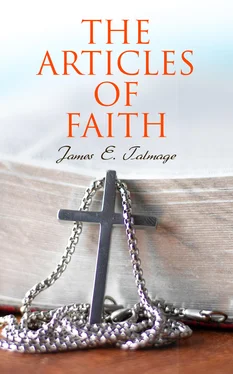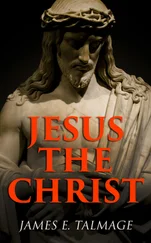26.Hence the justice of the scriptural doctrine that salvation comes to the individual only through obedience. "He became the author of eternal salvation unto all them that obey him"258 said Paul of the Christ. And further:—God "will render to every man according to his deeds: To them who, by patient continuance in well doing, seek for glory and honor and immortality, eternal life: But unto them that are contentious, and do not obey the truth, but obey unrighteousness, indignation and wrath, tribulation and anguish, upon every soul of man that doeth evil, of the Jew first, and also of the Gentile; But glory, honor, and peace, to every man that worketh good, to the Jew first, and also to the Gentile: For there is no respect of persons with God."259 To these may be added the words of the risen Lord, "He that believeth, and is baptized, shall be saved; and he that believeth not, shall be damned."260
27.Consider further the prophecy of King Benjamin proclaimed to the Nephite multitude:—Christ's blood "atoneth for the sins of those who have fallen by the transgression of Adam, who have died, not knowing the will of God concerning them, or who have ignorantly sinned. But wo, wo unto him who knoweth that he rebelleth against God; for salvation cometh to none such, except it be through repentance and faith on the Lord Jesus Christ."261 But why multiply scriptural citations when the whole tenor of sacred writ supports the doctrine? Without Christ no man can be saved, and the salvation provided at the cost of Christ's sufferings and bodily death is offered upon certain clearly defined conditions only; and these are summarized under "obedience to the laws and ordinances of the gospel."
28. Salvation and Exaltation.—Some degree of salvation will come to all who have not forfeited their right to it; exaltation is given to those only who by active labors have won a claim to God's merciful liberality by which it is bestowed. Of the saved, not all will be exalted to the higher glories; rewards will not be bestowed in violation of justice; punishments will not be meted out to the ignoring of mercy's claims. No one can be admitted to any order of glory, in short, no soul can be saved until justice has been satisfied for violated law. Our belief in the universal application of the atonement implies no supposition that all mankind will be saved with like endowments of glory and power. In the kingdom of God there are numerous degrees or gradations provided for those who are worthy of them; in the house of our Father there are many mansions, into which only those who are prepared are admitted. The old sectarian idea, that in the hereafter there will be but two places for the souls of mankind—heaven and hell, with the same glory in all parts of the one, and the same terrors throughout the other—is wholly untenable in the light of divine revelation. Through the direct word of the Lord we learn of varied degrees of glory.
29. Degrees of Glory.—The revelations of God have defined the following principal kingdoms or degrees of glory, as prepared through Christ for the children of men:
I. The Celestial Glory. 262—There are some who have striven to obey all the Divine commandments, who have accepted the testimony of Christ, and received the Holy Spirit; these are they who have overcome evil by godly works, and who are therefore entitled to the highest glory; these belong to the Church of the First Born, unto whom the Father has given all things; they are made Kings and Priests of the Most High, after the order of Melchisedek; they possess celestial bodies, "whose glory is that of the sun, even the glory of God, the highest of all, whose glory the sun of the firmament is written of as being typical;" they indeed are admitted to the celestial company, being crowned with the celestial glory, which makes them Gods.
II. The Terrestrial Glory. 263—We read of those who receive glory of a secondary order, differing from the highest as "the moon differs from the sun in the firmament;" these are they who, though honorable, were still in darkness, blinded by the craftiness of men, and unable to receive and obey the higher laws of God, they proved "not valiant in the testimony of Jesus," and therefore are not entitled to the fulness of glory.
III. The Telestial Glory. —We learn of a still lower kind of glory, differing from the higher orders as the stars differ from the brighter orbs of the firmament; this is given to those who received not the testimony of Christ, but who still did not deny the Holy Spirit; who have led lives exempting them from the heaviest punishment, yet whose redemption will be delayed till the last resurrection. In the telestial world there are innumerable degrees of glory, comparable to the varying lustre of the stars.264 Yet all who receive of any one of these orders of glory are at last saved, and upon them Satan will finally have no claim. Even the telestial glory, as we are told by those who have been permitted to gaze upon it, "surpasses all understanding; and no man knows it except him to whom God has revealed it."265 Then there are those who have lost all claim upon the immediate mercy of God; whose deeds have numbered them with Perdition and his angels.266
1. The Atonement Proved by Evidence.—"It is often asked: 'How is it that through the sacrifice of one who is innocent salvation may be purchased for those under the dominion of death?' We observe in passing that what should most concern man is not so much how it is that such is the case, but is it a fact? … To that question the blood sprinkled upon a thousand Jewish altars, and the smoke that darkened the heavens for ages from burnt offerings, answer yes. … Even the mythology of heathen nations retains the idea of an atonement that either has been, or is to be made for mankind. Fantastic, distorted, confused, buried under the rubbish of savage superstition it may be, but it nevertheless exists. So easily traced, so distinct is this feature of heathen mythology, that some writers have endeavored to prove that the gospel plan of redemption was derived from heathen mythology. Whereas the fact is that the gospel was understood and extensively preached in the earliest ages; men retained in their tradition a knowledge of those principles or parts of them, and however much they have been distorted, traces of them may still be found in nearly all the mythologies of the world. The prophets of the Jewish scriptures answer the question in the affirmative. The writers of the New Testament make Christ's atonement the principal theme of their discourses and epistles. The Book of Mormon, speaking as the voice of an entire continent of people whose prophets and righteous men sought and found God, testifies to the same great fact. The revelations of God as given through the Prophet Joseph Smith are replete with passages confirming this doctrine."—Roberts' Outlines of Ecclesiastical History, Section viii, 6.
2. Redemption from the Fall Universal and Unconditional.—"We believe that through the sufferings, death, and atonement of Jesus Christ all mankind, without one exception, are to be completely and fully redeemed, both body and spirit, from the endless banishment and curse to which they were consigned by Adam's transgression; and that this universal salvation and redemption of the whole human family from the endless penalty of the original sin, is effected without any conditions whatever on their part; that is, they are not required to believe or repent, or be baptized, or do anything else, in order to be redeemed from that penalty; for whether they believe or disbelieve; whether they repent or remain impenitent, whether they are baptized or unbaptized, whether they keep the commandments or break them, whether they are righteous or unrighteous, it will make no difference in relation to their redemption, both soul and body, from the penalty of Adam's transgression. The most righteous man that ever lived on the earth, and the most wicked wretch of the whole human family, were both placed under the same curse without any transgression or agency of their own, and they both alike will be redeemed from that curse, without any agency or conditions on their part."—Apostle Orson Pratt in Remarkable Visions.
Читать дальше












